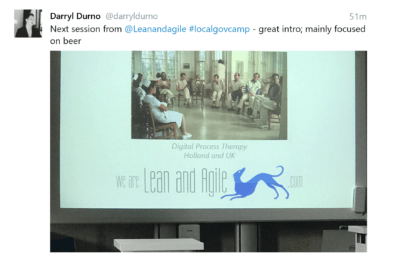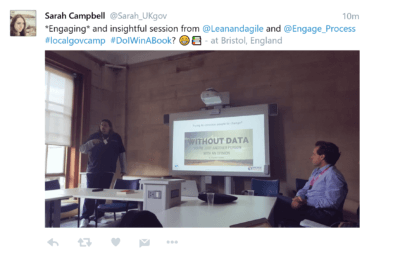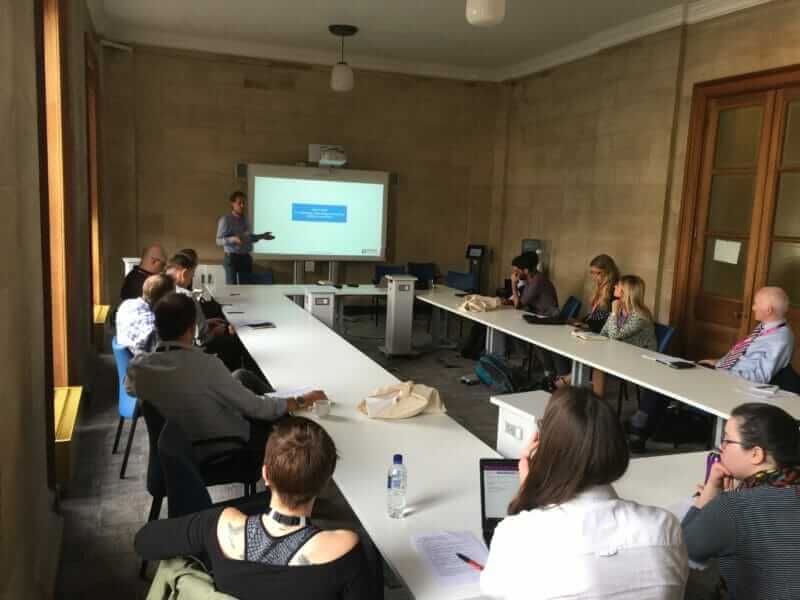Localgovcamp 2017 Bristol – Why should we map our processes?
Localgovcamp 2017 was back and in Bristol for the first time. It’s great to revisit Bristol and to see lots of old friends from my work there. Credit to Bristol City Council the work done on City Hall has made an already impressive building really fit for the future. I wish I had the chance to look around the offices but alas events keep you quite busy (which is never a bad thing!). I was up in Bristol on the Thursday so got a bit of sightseeing and Banksy hunting in before needing to set up the stand and meet my colleague from Holland Dick Langeveld of Engage Process (providers of the best Lean Process Software in the world!). This was my first chance to view the building and I was impressed.
Credit to Bristol City Council the work done on City Hall has made an already impressive building really fit for the future
After setting up the stall and meeting Dick it was time for a quick bit of preparation to bring our presentations together for the Friday fringe. Having been working as Engage Platinum partner for just over a year it made me reflect on the last Localgovcamp and how much our Engage UK family has grown. Ignoring consultants who use the tool a year earlier at Localgovcamp 16 we had our first couple of Local Authority users now we have 15 UK users with quite a few more in the wings. We have been planning for Localgovcamp 17 for a couple of months and wanted to deliver a combination of lessons from Holland (where over 100 Local Authorities are using the software as well as private sector companies) and lessons from the UK on how our customers are using the tool.
Ignoring consultants who use the tool a year earlier at Localgovcamp 16 we had our first couple of Local Authority users now we have 15 UK users with quite a few more in the wings
Pulling the presentation halves together was a great opportunity to learn and share with Dick our experiences from the respective clients. The pressures in Holland and the UK are remarkably similar (budget cuts, mergers, shared services and health/social care responsibilities moving/changing) and the software is being used in a multitude of different projects aimed at delivering these outcomes. It is very interesting to also talk about how private companies in Holland are using the software. As the software is 15 years old in Holland and 9 years in its current incarnation they have a huge broad customer base in the private sector from Ikea to Schiphol Airport and Bavaria Beer to the Dutch Post Office. There are companies such as Schiphol Airport using it for their lean teams to drive savings in their processes (with circa 56 million passengers a year using them a small change can make a big financial difference). There are franchisors using it to ensure consistent processes are delivered within their brand; banks to ensure processes are compliant with financial regulations; IT companies for ISO compliance and service management and Port of Amsterdam to manage and improve their operational procedures.
There are companies such as Schiphol Airport using it for their lean teams to drive savings in their processes (with circa 56 million passengers a year using them a small change can make a big financial difference).
That and a news event on the day made me reflect on the way I promote the software. As I am passionate about transformation and improving public services I always focus on the modelling of your processes in the context of improvement projects, generating business cases for change and identifying benefits. Given the context of public service budgets and the numbers of people leaving our public-sector organisations, there is a powerful argument that organisations need to map and model their existing processes to ensure knowledge is not lost to the organisation when key people leave. Having worked in and with many Local Authorities in the UK I have often come across a scenario where ‘only x knew about that and they left 2 years ago’. It is amazing public problems have not come from this (despite it causing frequent internal operational issues) but right at this moment Plymouth City Council published their report into the major issues they had with the last election
http://plymouthnewsroom.co.uk/council-acts-restore-voter-confidence-independent-investigation-published . I would recommend a read of the report document for anyone involved in elections as repeating this issue again will probably cause you even more problems than it has for PCC given the lessons being made public.
Given the context of public service budgets and the numbers of people leaving our public-sector organisations, there is a powerful argument that organisations need to map and model their existing processes to ensure knowledge is not lost to the organisation when key people leave
The problems Plymouth City Council encountered were that they failed to send that postal voters received 2 polling cards, some poll cards issued to electors where they were subsequently removed from the list and unable to vote, some registered postal voters did not get their postal vote packs and just to top it off an inaccurate (but fortunately it would not have affected the result) count declared for one of the constituencies. This truly was Plymouths election horriblis.
This truly was Plymouths election horriblis
A report was commissioned to investigate how this could happen and I will cover the report in more detail in another blog but the highlighted issues of the report were as follows:
- Longstanding known capacity and capability issues in the elections service added to by the loss of a manager at the start of 2016 and another experienced team member at the end of 2016
- As a direct consequence of the shortfall in capacity and capability the registration and electoral operational system and process lacks integrity and robustness. The lack of a detailed operational procedure manual, the lack of experience and understanding of the current electoral management system, the lack of operational management grip, integration of tasks and the absence of effective quality controls, quality assurance and independent checking are critical points of failure in the system
- There had been insufficient progress on the reengineering of their processes the need for this highlighted in 2015 and ‘delivered’ in May 2016 (the issue happened May 2017)
- Communications after identifying the initial issue were ‘not as effective as they needed to be’
Effectively (so far) the costs of the report and the issues have been £75k reduced by over £7k by senior officers forgoing their fees. There are significant numbers of actions to deliver as a result of this and still the potential for fines/penalties from the Election Commission. This was a totally avoidable situation and knowledge of the issues were known for at least 2 years prior to the incident.
Plymouth City Council were unlucky, the incidents happened and no member of staff managed to catch them to avoid the problems. How many near misses have happened in your organisation or even issues in processes where the impact is not as high? I can see a need in organisations to map key processes just to ensure they are understood not just for improvement purposes. We actually have customers just mapping the As Is but they are doing it for a software rationalisation programme not just to preserve/share process knowledge.
Plymouth City Council were unlucky, the incidents happened and no member of staff managed to catch them to avoid the problem. How many near misses have happened in your organisation or even issues in processes where the impact is not as high?
Speaking of near misses our giveaway at Localgovcamp 17 was Black Box Thinking by Matthew Syed. I spend an awful lot of time in my car and have recently taken and Audible licence allowing me to listen to a large number of miles whilst travelling our lovely motorway system to and from the South West.

One of these books I listened to recently was Black Box Thinking and I can heartily recommend it to anyone working in any sector. The lessons from the aviation industry and how they have been successfully applied elsewhere are thought provoking and real tangible things can be taken from this book and applied in your workplace. So as part of our promotion of Lean Book Clubs we gave away a number of copies to those who tweeted us with the best tweet/photo at Localgovcamp (see pictures for the winners). We encourage the winners to read and share with their colleagues.

Friday came and we had a great day on the stall and in our 2 presentations. Being in Bristol it’s great to see so many new faces as well as lots of old friends. I love the regional nature of the delivery of the event but I do wonder if the event could be run across 2 venues once a year maybe day 1 could be Bristol with another in Manchester? The presentations went well and lots of people had demonstrations of the software to really see the benefits. We have booked a large number of demo’s and some free trials for colleagues at the event. It’s really great to see the good work going on in Local Authorities. One of the draw backs of being an exhibitor and speaker at these events is that you do not get to see many other sessions (especially when you are delivering 2 sessions) but unfortunately, I am there to work.

One of the exceptions to my lack of attendance was a presentation by
Anthony Peake of
Software Solved. Anthony pitched and delivered a session titled ‘How can local government reduce digital TX costs by 50% and generate revenue’ This was an excellent session and a number of people commented on how good it was and the ‘best session of the day’ (obviously excluding ours!). Anthony works for Software Solved (look them up they do great things) and was talking to Nick Hill about how he had recently done a deal with 150 military charities who were going to spend £1m on a case management system which they would own. Anthony offered to provide the system for £500k and fund £500k development from his company in return he got the IP to sell the system and they got 5% of any future sales. So that’s £500k savings and a potential income stream not bad. Added to that they get a modern system fast, reductions in running costs, scalability and security built in and a ready made user group with the opportunity to shape development.
So that’s £500k savings and a potential income stream not bad!
Obviously, this was initially met with some cynicism as who of us trusts a supplier? But weighing it up the software company owns the IP (but to be fair they are not in that game and not in a position to leverage it) but shares the development cost. The
software company covers all sales and marketing costs. Software Solved get some great market insight from the business users and also a number of reference sites. Even more important the charities know that Software Solved has a business driver to not only deliver but also to enhance the product over time to ensure future sales. After the discussion they all agreed this was a great deal and a true Win:Win scenario.
That set the scene for the discussion and the obvious parallel with 400+ Local Authorities and their digital transformation investments. Could we not collaborate better between us and save money? Could a similar partnership work with the private sector for Local Government? The session discussed a number of aspects to this: Do your organisations have common needs for digital? Do your organisations 860+ plus services that are all unique to your Council? Is there a procurement barrier to this type of deal? Can you trust the private sector? Do you need to own the IP (can you actually commercialise it if you do)? Can you agree service standards, data, processes, user journeys and APIs? Can you agree funding and compromise on requirements?
There are obviously challenges in there but the scale of the prize and the obvious sense of the proposal must justify effort. The room broadly agreed that they could support such a deal but next we discussed the benefits and Anthony asked the following 2 key questions based on an estimate of publish spend data from various Local Authorities:
Do 415 councils really need to spend £50,000+ each on maintaining websites (£20M+ Annually)?
Do 415 councils need to plan to invest £1m each in self-service platforms (£400M+)?
Clearly these figures are eye openers and clearly there must be a better way, could Localgovcamp start to look at how this idea may be realised? Overall an excellent session and some great food for thought.
On a related topic we would be really happy to help and facilitate sessions aimed at identifying the most efficient processes for Local Authorities. We hope to be working with Localgovcamp team and Nick Hill and the
Public Sector Digital Transformation Forum to start to deliver some of these events and to share the outcomes with the network.
Huge thanks to Nick Hill and all of the Localgovcamp team who bring this great event together on top of their day jobs. Now onto Govcamp Cymru for my first visit, see you all at an event soon.


 One of these books I listened to recently was Black Box Thinking and I can heartily recommend it to anyone working in any sector. The lessons from the aviation industry and how they have been successfully applied elsewhere are thought provoking and real tangible things can be taken from this book and applied in your workplace. So as part of our promotion of Lean Book Clubs we gave away a number of copies to those who tweeted us with the best tweet/photo at Localgovcamp (see pictures for the winners). We encourage the winners to read and share with their colleagues.
One of these books I listened to recently was Black Box Thinking and I can heartily recommend it to anyone working in any sector. The lessons from the aviation industry and how they have been successfully applied elsewhere are thought provoking and real tangible things can be taken from this book and applied in your workplace. So as part of our promotion of Lean Book Clubs we gave away a number of copies to those who tweeted us with the best tweet/photo at Localgovcamp (see pictures for the winners). We encourage the winners to read and share with their colleagues.
 Friday came and we had a great day on the stall and in our 2 presentations. Being in Bristol it’s great to see so many new faces as well as lots of old friends. I love the regional nature of the delivery of the event but I do wonder if the event could be run across 2 venues once a year maybe day 1 could be Bristol with another in Manchester? The presentations went well and lots of people had demonstrations of the software to really see the benefits. We have booked a large number of demo’s and some free trials for colleagues at the event. It’s really great to see the good work going on in Local Authorities. One of the draw backs of being an exhibitor and speaker at these events is that you do not get to see many other sessions (especially when you are delivering 2 sessions) but unfortunately, I am there to work.
Friday came and we had a great day on the stall and in our 2 presentations. Being in Bristol it’s great to see so many new faces as well as lots of old friends. I love the regional nature of the delivery of the event but I do wonder if the event could be run across 2 venues once a year maybe day 1 could be Bristol with another in Manchester? The presentations went well and lots of people had demonstrations of the software to really see the benefits. We have booked a large number of demo’s and some free trials for colleagues at the event. It’s really great to see the good work going on in Local Authorities. One of the draw backs of being an exhibitor and speaker at these events is that you do not get to see many other sessions (especially when you are delivering 2 sessions) but unfortunately, I am there to work.
 One of the exceptions to my lack of attendance was a presentation by Anthony Peake of Software Solved. Anthony pitched and delivered a session titled ‘How can local government reduce digital TX costs by 50% and generate revenue’ This was an excellent session and a number of people commented on how good it was and the ‘best session of the day’ (obviously excluding ours!). Anthony works for Software Solved (look them up they do great things) and was talking to Nick Hill about how he had recently done a deal with 150 military charities who were going to spend £1m on a case management system which they would own. Anthony offered to provide the system for £500k and fund £500k development from his company in return he got the IP to sell the system and they got 5% of any future sales. So that’s £500k savings and a potential income stream not bad. Added to that they get a modern system fast, reductions in running costs, scalability and security built in and a ready made user group with the opportunity to shape development.
One of the exceptions to my lack of attendance was a presentation by Anthony Peake of Software Solved. Anthony pitched and delivered a session titled ‘How can local government reduce digital TX costs by 50% and generate revenue’ This was an excellent session and a number of people commented on how good it was and the ‘best session of the day’ (obviously excluding ours!). Anthony works for Software Solved (look them up they do great things) and was talking to Nick Hill about how he had recently done a deal with 150 military charities who were going to spend £1m on a case management system which they would own. Anthony offered to provide the system for £500k and fund £500k development from his company in return he got the IP to sell the system and they got 5% of any future sales. So that’s £500k savings and a potential income stream not bad. Added to that they get a modern system fast, reductions in running costs, scalability and security built in and a ready made user group with the opportunity to shape development.

